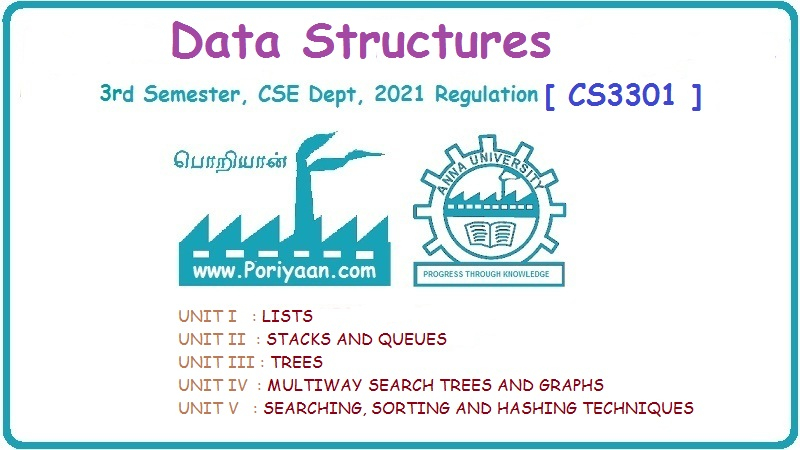Data Structure: Unit III: Trees
Tree Traversal
Definition, Algorithm with Example C Programs | ADT Data Structure
Tree traversal means visiting each node exactly once. Basically there are six ways to traverse a tree.
Tree Traversal
• Definition: Tree traversal means
visiting each node exactly once.
•Basically
there are six ways to traverse a tree. For these traversals we will use
following notations :
L for moving to left child
R for moving to right child
D for parent node
• Thus
with L, R, D we will have six combinations such as LDR, LRD, DLR, DRL, RLD,
RDL.
• From
computation point of view, we will consider only three combinations as LDR, DLR
and LRD i.e. inorder, preorder and postorder respectively.
1) Inorder Traversal :
In this
type of traversal, the left node is visited, then parent node and then right
node is visited.
For
example
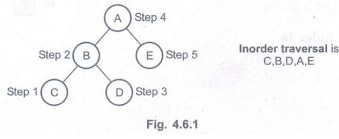
Algorithm:
1. If
tree is not empty then
a.
traverse the left subtree in inorder
b. visit
the root node
c.
traverse the right subtree in inorder
The
recursive routine for inorder traversal is as given below to
void
inorder(node *temp)
{
if(temp!=
NULL)
{
inorder(temp->left);
printf("%d",temp->data);
inorder(temp->right);
}
}
2) Preorder Traversal :
In this
type of traversal, the parent node or root node is visited first; then left
node and finally right node will be visited.
For example
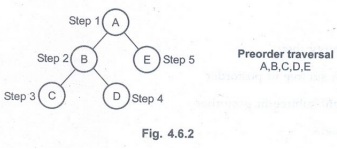
Algorithm:
1. If tree is not empty then
a. visit the root node
b. traverse the left subtree in preorder
c. traverse the right subtree in preorder
The
recursive routine for preorder traversal is as given below.
void
preorder(node *temp)
{
if(temp!=
NULL)
{
printf("%d",temp->data);
preorder(temp->left);
preorder(temp->right);
}
}
3) Postorder Traversal :
In this
type of traversal, the left node is visited first, then right node and finally
parent node is visited.
For example
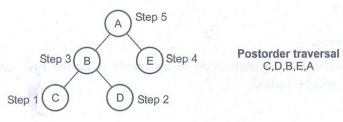
Algorithm:
1. If
tree is not empty then
a.
traverse the left subtree in postorder
b.
traverse the right subtree in postorder
c. visit
the root node
The
recursive routine for postorder traversal is as given below.
void
postorder(node *temp)
{
if(temp!=
NULL)
{
postorder(temp->left);
postorder(temp->right);
printf("%d",temp->data);
}
}
Ex. 4.6.1: Write inorder, preorder and
postorder traversal for the following tree:
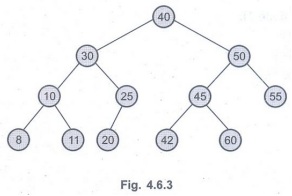
Sol. :
Inorder 8 10 11 30 20 25 40 42 45 60
50 55
Preorder 40 30 10 8 11 25 20 50 45 42
60 55
Postorder 8 11 10 20 25 30 42 60 45 55
50 40.
Ex. 4.6.2. Implementation of binary tree
Sol. :
/***************************************************************
Program
for creation of a binary tree and display the tree using recursive inorder,
preorder and post order traversals
****************************************************************/
#include
<stdio.h>
#include
<alloc.h>
#include<conio.h>
typedef
struct bin
{
int
data;
struct
bin *left;
struct
bin *right;
}node;/*Binary
tree structure*/
void
insert(node *, node *);
void
inorder(node *);
void
preorder(node *);
void
postorder(node *);
node
*get_node();
void
main()
{
int
choice;
char
ans='n';
node
*New,*root;
root=NULL;
clrscr();
do
{
printf("\n
Program For Implementing Simple Binary Tree");
printf("\n
1.Create");
printf("\n
2.Inorder");
printf("\n
3.Preorder ");
printf("\n
4.Postorder");
printf("\n
5.Exit");
printf("\n\t
Enter Your Choice: ");
scanf("%d",
&choice);
switch(choice)
{
case
1:root = NULL;
do
{
New
get_node();
printf("\n
Enter The Element: ");
scanf("%d",
&New->data);
if(root
== NULL)
root=New;
else
insert(root,New);
printf("\n
Do You want To Enter More elements?(y/n):");
ans=getche();
} while
(ans=='y' || ans == 'Y');
clrscr();
break;
case
2:if(root == NULL)
printf("Tree
Is not Created!");
else
inorder(root);
break;
case
3:if(root == NULL)
printf("Tree
Is Not Created!");
else
preorder(root);
break;
case
4:if(root == NULL)
printf("Tree
Is Not Created!");
else
postorder(root);
break;
}
}while(choice!=5);
}
node
*get_node()
{
node
*temp;
temp=(node
*)malloc(sizeof(node));
temp->left
= NULL;
temp->right=
NULL;
return
temp;
}
void
insert(node *root,node *New)
{
char ch;
printf("\n
Where to insert left/right of %d: ", root->data);
ch=getche();
if
((ch=='r') || (ch=='R'))
{
if(root->right==
NULL)
{
root->right=New;
}
else
insert(root->right,New);
}
else
{
if
(root->left== NULL)
{
root->left=New;
}
else
insert(root->left,
New);
}
}
void
inorder(node *temp)
{
if(temp!=
NULL)
{
inorder(temp->left);
printf("%d",temp->data);
inorder(temp->right);
}
}
void
preorder(node *temp)
{
if(temp!=
NULL)
{
printf("%d",temp->data);
preorder(temp->left);
preorder(temp->right);
}
}
void
postorder(node *temp)
{
if(temp!=
NULL)
{
postorder(temp->left);
postorder(temp->right);
printf("%d",temp->data);
}
}
Output
Program
For Implementing Simple Binary Tree
1.Create
2.Inorder
3.Preorder
4.Postorder
5.Exit
Enter
Your Choice: 1
Enter
The Element: 10
Do You
Want To Enter More Elements?(y/n): y
Enter
The Element: 12
Where to
insert left/right of 10: 1
Do You
Want To Enter More Elements?(y/n): y
Enter
The Element: 17
Where to
insert left/right of 10: r
Do You
Want To Enter More Elements?(y/n): y
Enter
The Element: 8
Where to
insert left/right of 10:1
Where to
insert left/right of 12: r
Do You
Want To Enter More Elements?(y/n):
Program
For Implementing Simple Binary Tree
1.Create
2.Inorder
3.Preorder
4.Postorder
5.Exit
Enter
Your Choice: 2
12 8 10
17
Program
For Implementing Simple Binary Tree
1.Create
2.Inorder
3.Preorder
4.Postorder
5.Exit
Enter
Your Choice: 3
10 12 8
17
Program
For Implementing Simple Binary Tree
1.Create
2.Inorder
3.Preorder
4.Postorder
5.Exit
Enter
Your Choice: 4
8 12 17
10
Program
For Implementing Simple Binary Tree
1.
Create
2.
Inorder
3.
Preorder
4.
Postorder
5. Exit
Enter
Your Choice: 5
Review Question
1. Explain the tree traversal
techniques with an example.
Data Structure: Unit III: Trees : Tag: : Definition, Algorithm with Example C Programs | ADT Data Structure - Tree Traversal
Related Topics
Related Subjects
Data Structure
CS3301 3rd Semester CSE Dept | 2021 Regulation | 3rd Semester CSE Dept 2021 Regulation
